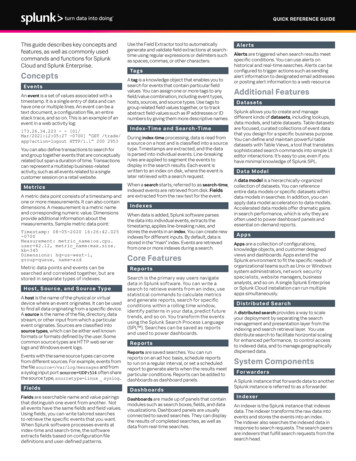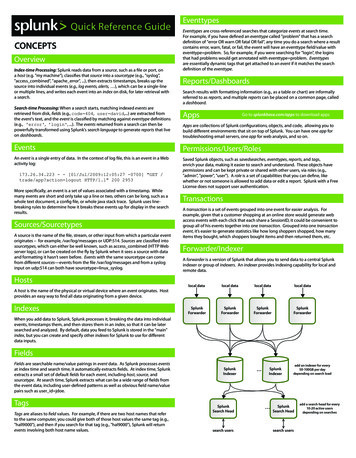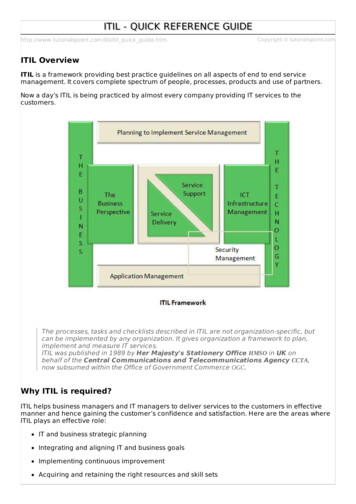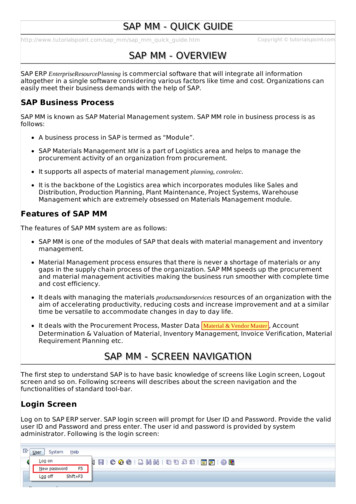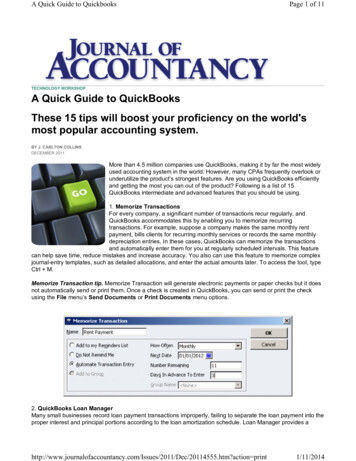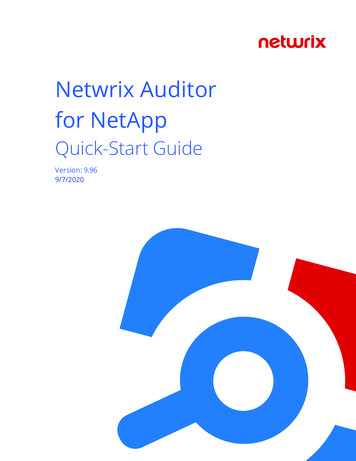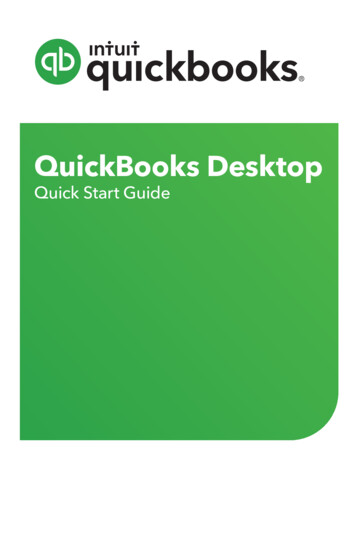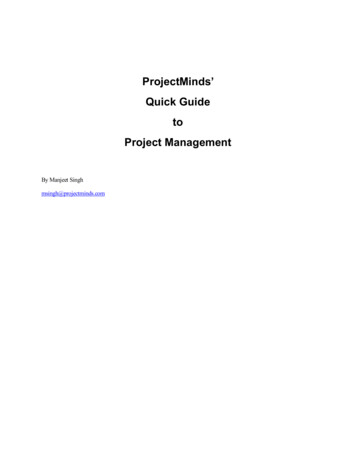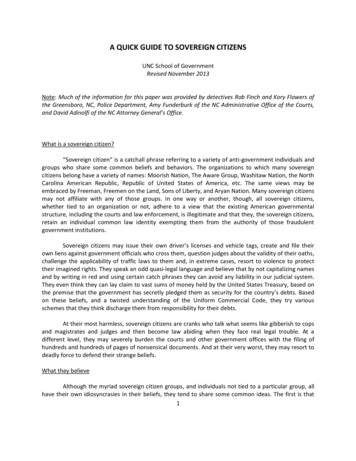
Transcription
A QUICK GUIDE TO SOVEREIGN CITIZENSUNC School of GovernmentRevised November 2013Note: Much of the information for this paper was provided by detectives Rob Finch and Kory Flowers ofthe Greensboro, NC, Police Department, Amy Funderburk of the NC Administrative Office of the Courts,and David Adinolfi of the NC Attorney General’s Office.What is a sovereign citizen?“Sovereign citizen” is a catchall phrase referring to a variety of anti-government individuals andgroups who share some common beliefs and behaviors. The organizations to which many sovereigncitizens belong have a variety of names: Moorish Nation, The Aware Group, Washitaw Nation, the NorthCarolina American Republic, Republic of United States of America, etc. The same views may beembraced by Freeman, Freemen on the Land, Sons of Liberty, and Aryan Nation. Many sovereign citizensmay not affiliate with any of those groups. In one way or another, though, all sovereign citizens,whether tied to an organization or not, adhere to a view that the existing American governmentalstructure, including the courts and law enforcement, is illegitimate and that they, the sovereign citizens,retain an individual common law identity exempting them from the authority of those fraudulentgovernment institutions.Sovereign citizens may issue their own driver’s licenses and vehicle tags, create and file theirown liens against government officials who cross them, question judges about the validity of their oaths,challenge the applicability of traffic laws to them and, in extreme cases, resort to violence to protecttheir imagined rights. They speak an odd quasi-legal language and believe that by not capitalizing namesand by writing in red and using certain catch phrases they can avoid any liability in our judicial system.They even think they can lay claim to vast sums of money held by the United States Treasury, based onthe premise that the government has secretly pledged them as security for the country’s debts. Basedon these beliefs, and a twisted understanding of the Uniform Commercial Code, they try variousschemes that they think discharge them from responsibility for their debts.At their most harmless, sovereign citizens are cranks who talk what seems like gibberish to copsand magistrates and judges and then become law abiding when they face real legal trouble. At adifferent level, they may severely burden the courts and other government offices with the filing ofhundreds and hundreds of pages of nonsensical documents. And at their very worst, they may resort todeadly force to defend their strange beliefs.What they believeAlthough the myriad sovereign citizen groups, and individuals not tied to a particular group, allhave their own idiosyncrasies in their beliefs, they tend to share some common ideas. The first is that1
there are two classes of citizens within the United States. One class is sovereign or “de jure” citizens or“original citizens of the states.” The second class, first created by the Fourteenth Amendment, is federalor U.S. citizens. Sovereign citizens enjoy all the rights of the constitution, but federal citizens do not.Federal citizens, the sovereigns believe, have bargained away their freedoms by accepting benefits fromthe United States government. Much of what sovereigns do is intended to rescind or denounce thatfederal citizenship and reclaim their common law sovereign citizen status with all its rights. That helpsexplain why they refuse to get drivers’ licenses or register vehicles, reject Social Security, avoid using ZIPcodes, and may not pay taxes, because those are all forms of contracting with the government andaccepting the lesser class of federal citizenship.Reconstruction history is important to many sovereign citizens. Their view is that thegovernments established in southern states after the Civil War were imposed against the will of andwithout the consent of the citizens and are not lawful. These sovereigns distinguish between the originalstate, of which they are citizens, and the false and illegitimate state that occupies the same territory.And, as already mentioned, they view the Fourteenth Amendment as the source of the new separateclass of federal citizenship.A second significant tenet for sovereign citizens, blending with the distinction betweensovereign and federal citizens, is that when the federal government abandoned the gold standard in the1930s it substituted its citizens as collateral for the country’s debts by pledging each citizen’s futureearnings to foreign investors. As with all other aspects of sovereign ideology, the details can varyconsiderably, but generally the explanation for how this happens is that a secret United States Treasuryaccount is set up for each citizen at birth, some large sum of money placed in it or pledged to it, rangingfrom hundreds of thousands of dollars — 630,000 is a common number — to millions depending onwhich sovereign citizen group’s version you hear. As a consequence, they say, two separate identitiesare created. The corporate shell account, the one pledged as security, is the “strawman” to whichsovereign citizens refer and, in their view, is separate and distinct from their true flesh and bloodidentity.In sovereign citizens’ view, the government-controlled and enslaved strawman is evidenced bydocuments showing the person’s name in all capital letters. Birth certificates, social security cards,driver’s licenses, tax forms, etc., therefore, represent only the shell corporate identity, the strawman,because they are written in all caps.A sovereign citizen avoids inadvertent subjection to this false government, and avoids beingmistaken for a federal citizen, by signing documents in a certain manner — for example, by identifyingoneself as “John Doe, Executive Trustee for the Private Contract Trust known as JOHN DOE.” Or byidentifying oneself as executor for the strawman, or using a copyright symbol with the name, or saying“John Doe, Secured Party, Authorized Representative, Attorney-in-Fact in behalf of JOHN DOE ,” orinterspersing colons or hyphens or other odd punctuation in the name, or using the prefix “Noble” orthe suffix “Bey” or “El Bey” with one’s name. And so on.To further avoid inadvertent submission to the false government, the sovereign citizen may usered ink, add thumbprints to documents, put the zip code in brackets or say “near” as part of the address.There are innumerable varieties of this queer view of the law, but all are intended by the sovereign2
citizen to make sure you know you are no longer dealing with the enslaved strawman or a federal citizenwith limited rights, you now have the real common law flesh and blood sovereign citizen in front of you.Sovereign citizens’ views about the strawman and the treasury account also help explain theirfascination with the Uniform Commercial Code. They tend to believe that by filing a UCC financingstatement they can establish their superior right to that Treasury account. Having established such aright they then can create bonds which they tender to creditors as payment of their debts. As they readthe UCC, if the creditor wrongly refuses to accept this tender the sovereign debtor is discharged fromany responsibility. There are various other UCC schemes as well that involve security agreements, holdharmless agreements, birth certificate bonds, and various UCC forms.Again, the beliefs and practices can vary considerably from group to group and person toperson, but once you are familiar with the ideas above you are more likely to realize you are dealingwith a sovereign citizen. A sovereign citizen named Fred Jones may say “I am agent of Fred Jones” toinform you that he is not the corporate entity strawman FRED JONES and thus is beyond the court’sjurisdiction. Sovereign citizens may want to bring their own court reporters to court proceedings. Therewill be talk about common law, about Admiralty Law, and about oaths of office. A sovereign citizen maycarry a copy of Black’s Law Dictionary as a reference resource for their common law views. For thosewho identify themselves as Moorish Nation or something similar, there also is belief that a 1787 treaty(fictitious) between the United States and Morocco grants them immunity from US law. Some may claimto occupy United Nations Indigenous People’s Seat 215 — there is no such thing — and create their ownbirth certificates and passports in addition to driver’s license and vehicle registrations.Sovereign citizens tend to believe in squatters’ rights and have been known to move into housesthat have been foreclosed and abandoned. They will fix up the place and have utilities turned on, thenwill file documents they believe confirm their new ownership of the property.The point to remember is that, whatever circuitous and illogical route they take to get there —there is no point in trying to find a consistency or a rational pattern in the beliefs — sovereign citizensreject the current federal, state and local governments and consider themselves outside their authority.Ironically enough, at the same time they file paper after paper with the very courts whose legitimacythey deny, seeking to vindicate their common law rights.North Carolina appellate casesThere are few state appellate court decisions debunking sovereign citizens’ arguments becausesovereign citizens almost always represent themselves and either do not appeal the trial court decisionsagainst them or are unable to perfect an appeal properly. Also, most of the arguments they make are soobviously frivolous that courts feel free to reject them without much explanation. There are, though, atleast two North Carolina Court of Appeals’ opinions discussing and rejecting a sovereign citizen’sarguments about the trial court’s lack of jurisdiction over him. The opinions, both involving the samedefendant, are State v. Phillips I, 149 N.C. App. 310 (2002), and State v. Phillips II, 152 N.C. App. 679(2002). The first opinion includes the more detailed discussion of the defendant’s assertions aboutjurisdiction. For the most part the second opinion refers back to the first opinion. Then in Phillips v.3
Wood, 341 F.Supp.2d 576 (MDNC 2004), the federal district court rejected the same defendant’sattempts to sue the state judges and magistrate for their actions in connection with his stateconvictions.Names of their organizationsTwo of the most prevalent sovereign citizen groups in North Carolina are the Moorish Nationand the Washitaw Nation. Moorish Nation adherents may refer also to the Moorish Science Temple,Moorish Republic, United Nuwaubian Nation of Moors (NUNM), MU’UR Republic or other variations.Moorish sovereigns tend to be black and younger; many get started on this path in prison. TheWashitaw Nation, a Moorish branch, is tied to a group in Poverty Point, Louisiana. White supremacistorganizations such as the Aryan Nation may embrace sovereign citizen ideology as well. So too mayFreemen and related groups.Organizations such as the North-Carolina American Republic (in the Mooresville area), theEmbassy of Heaven, Aware Group and Carolina Liberty also sometimes are listed as sovereign citizens,but at least some of them say they are different. The North-Carolina American Republic, for example,distinguishes itself as believing it is the real sovereign state of North Carolina, rejecting the notion ofseparate sovereign rights for individuals. Their particular fantasy is that the state government put inplace by the Reconstruction Acts is invalid and that they have re-established the legitimate governmentof the state. Accordingly the North-Carolina American Republic has named its own governor, legislature,etc. It’s a different route than the one followed by sovereign citizens but leads to the same self-servingconclusion that the established state institutions do not have jurisdiction over them.Not all sovereign citizens affiliate with any particular organization. Individuals may accesssovereign citizen theory and documents easily through the internet. And not surprisingly there are anynumber of vendors of driver’s licenses, license tags, pleadings and other papers who are glad to sell theirwares to anyone who sees in them a means to be free from traffic tickets, debts, taxes and othergovernment obligations.IdentificationSovereign citizens may drive vehicles — which they will call “conveyances” — with odd licensetags and registration documents. The license tag might say “Republic of North Carolina” or somethingalong those lines, or “Kingdom of Heaven” or “Washitaw Nation” or “Washitaw Trustee” or a variationon those or the other organizational names mentioned above. A common license tag and registrationwill say “MU’UR REPUBLIC” and have a United Nations symbol with the words “Indigenous National” orsomething similar. Also look for words like “Private Registrant.” Sovereign citizens also tend to put goldstickers on documents and use multiple notary stamps.Sovereign citizens typically carry their own unique drivers’ licenses. Just as with the vehicle tags,the driver’s license may be issued in the name of the Washitaw Nation, North Carolina AmericanRepublic or whatever particular sect the person has chosen. Some groups issue what appears to be a4
passport from a foreign government, but on closer examination the issuer is the MU’UR Republic or ISISAbaannaki Aboriginal Nation or other make-believe government. One common factor in much sovereigncitizen identification, particularly for blacks, is inclusion of “Bey” or “El Bey” in the person’s name, suchas “John-Doe El Bey.”In addition to this contrived identification the sovereign citizen may carry a legitimate statedriver’s license. When stopped by an officer or otherwise asked by an official for identification, theperson may produce the fictitious driver’s license first but then when backed into a corner will pull out areal license. Some sovereign citizens have gotten regular state drivers’ licenses issued to them with theirEl Bey na
harmless agreements, birth certificate bonds, and various UCC forms. Again, the beliefs and practices can vary considerably from group to group and person to person, but once you are familiar with the ideas above you are more likely to realize you are dealing with a sovereign citizen. A sovereign citizen named Fred Jones may say “I am agent of Fred Jones” to inform you that he is not the .

